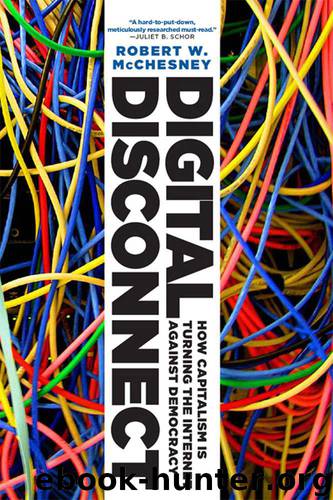Digital Disconnect: How Capitalism is Turning the Internet Against Democracy by McChesney Robert W

Author:McChesney, Robert W. [McChesney, Robert W.]
Language: eng
Format: epub
ISBN: 9781595588913
Publisher: New Press, The
Published: 2013-03-04T23:00:00+00:00
A Military-Digital Complex?
In his farewell address in 1961, President Dwight D. Eisenhower ominously warned about the military-industrial complex that had emerged as a cornerstone of the American political economy in the postwar years, with powers previously unknown in American history. The former Supreme Allied Commander in Europe during World War II decried the shared interests of warmakers, large corporations, and politicians that would render the public largely powerless to provide any opposition. In grave terms he charted how this could lead to the end of any humane or democratic society in the war-fearing spirit of James Madison and Thomas Jefferson. It was one of the most extraordinary speeches by a president or any political leader in American history.202 His warnings had no effect precisely for the reason he expressed concern: there were many powerful elements of society that benefited from a permanent wartime economy, and no powerful elements that were significantly harmed by a permanent wartime economy.
Eisenhower’s words were accurate at the time, and his analysis has proven depressingly prescient. Except for a brief hiccup in the 1970s in the aftermath of the Vietnam War, the system has been unchallenged. Military and national security spending has continued to grow and has remained a large and constant part of the economy. By 2012 the United States spent roughly $1 trillion on the military annually, when all the wars, nuclear weapons, secret budgets, and interest payments on debt are taken into consideration.203 America has around 5 percent of the world’s population but 50 percent of global military spending. “We don’t have any enemies in Congress,” a senior defense official told Rachel Maddow in 2011. “We have to fight Congress to cut programs, not keep them.”204 When Americans are directly informed of how much the government actually spends on the military compared to other programs, a significant percentage, arguably a strong majority, believe the military is a logical place for sharp cuts in government spending.205
Military spending plays a central role in the economy. It provides demand for goods and services without putting any products on the market that compete with those produced in the private sector, so it is a definite stimulus to production and an antidote to stagnation. Military spending is also a windfall for the firms that are the recipients of military contracts, especially as an increasing portion of the budget is outsourced. Military spending has been the basis for much of the research and development spending in high technology in the United States. As I discussed in chapter 4, its role has been and remains crucial to the development of the commercial Internet. Many economists rightly point out that there are far more effective ways for the government to spend money to stimulate economic growth or spur research, but those options either have no political support from powerful lobbies or face ferocious opposition from them. The late Chalmers Johnson wistfully hoped the United States could eliminate its empire and return to being a republic, in a soft landing. The evidence
Download
This site does not store any files on its server. We only index and link to content provided by other sites. Please contact the content providers to delete copyright contents if any and email us, we'll remove relevant links or contents immediately.
| Anarchism | Communism & Socialism |
| Conservatism & Liberalism | Democracy |
| Fascism | Libertarianism |
| Nationalism | Radicalism |
| Utopian |
The Secret History by Donna Tartt(19034)
The Social Justice Warrior Handbook by Lisa De Pasquale(12183)
Thirteen Reasons Why by Jay Asher(8885)
This Is How You Lose Her by Junot Diaz(6873)
Weapons of Math Destruction by Cathy O'Neil(6261)
Zero to One by Peter Thiel(5783)
Beartown by Fredrik Backman(5734)
The Myth of the Strong Leader by Archie Brown(5495)
The Fire Next Time by James Baldwin(5426)
How Democracies Die by Steven Levitsky & Daniel Ziblatt(5211)
Promise Me, Dad by Joe Biden(5141)
Stone's Rules by Roger Stone(5080)
A Higher Loyalty: Truth, Lies, and Leadership by James Comey(4947)
100 Deadly Skills by Clint Emerson(4915)
Rise and Kill First by Ronen Bergman(4776)
Secrecy World by Jake Bernstein(4739)
The David Icke Guide to the Global Conspiracy (and how to end it) by David Icke(4697)
The Farm by Tom Rob Smith(4501)
The Doomsday Machine by Daniel Ellsberg(4482)
